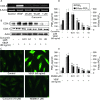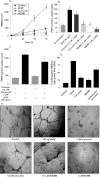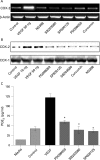Curcumin inhibits VEGF-mediated angiogenesis in human intestinal microvascular endothelial cells through COX-2 and MAPK inhibition
- PMID: 18596194
- PMCID: PMC2582343
- DOI: 10.1136/gut.2008.152496
Curcumin inhibits VEGF-mediated angiogenesis in human intestinal microvascular endothelial cells through COX-2 and MAPK inhibition
Abstract
Background: Angiogenesis, the growth of new blood vessels, is a critical homeostatic mechanism which regulates vascular populations in response to physiological requirements and pathophysiological demand, including chronic inflammation and cancer. The importance of angiogenesis in gastrointestinal chronic inflammation and cancer has been defined, as antiangiogenic therapy has demonstrated benefit in models of inflammatory bowel disease and colon cancer treatment. Curcumin is a natural product undergoing evaluation for the treatment of chronic inflammation, including inflammatory bowel disease (IBD). The effect of curcumin on human intestinal angiogenesis is not defined.
Methods: The antiangiogenic effect of curcumin on in vitro angiogenesis was examined using primary cultures of human intestinal microvascular endothelial cells (HIMECs), stimulated with vascular endothelial growth factor (VEGF).
Results: Curcumin inhibited proliferation, cell migration and tube formation in HIMECs induced by VEGF. Activation of HIMECs by VEGF resulted in enhanced expression of cyclo-oxygenase-2 (COX-2) mRNA, protein and prostaglandin E(2) (PGE(2)) production. Pretreatment of HIMECs with 10 microM curcumin as well as 1 microM NS398, a selective inhibitor of COX-2, resulted in inhibition of COX-2 at the mRNA and protein level and PGE(2) production. Similarly COX-2 expression in HIMECs was significantly inhibited by Jun N-terminal kinase (JNK; SP600125) and p38 mitogen-activated protein kinase (MAPK; SB203580) inhibitors and was reduced by p44/42 MAPK inhibitor (PD098059).
Conclusions: Taken together, these data demonstrate an important role for COX-2 in the regulation of angiogenesis in HIMECs via MAPKs. Moreover, curcumin inhibits microvascular endothelial cell angiogenesis through inhibition of COX-2 expression and PGE(2) production, suggesting that this natural product possesses antiangiogenic properties, which warrants further investigation as adjuvant treatment of IBD and cancer.
Conflict of interest statement
Figures






Similar articles
-
Involvement of COX-2 in VEGF-induced angiogenesis via P38 and JNK pathways in vascular endothelial cells.Cardiovasc Res. 2006 Feb 1;69(2):512-9. doi: 10.1016/j.cardiores.2005.09.019. Epub 2005 Dec 5. Cardiovasc Res. 2006. PMID: 16336951
-
Sodium butyrate inhibits angiogenesis of human intestinal microvascular endothelial cells through COX-2 inhibition.FEBS Lett. 2003 Nov 6;554(1-2):88-94. doi: 10.1016/s0014-5793(03)01110-4. FEBS Lett. 2003. PMID: 14596920
-
Selective inhibition of vascular endothelial growth factor-mediated angiogenesis by cyclosporin A: roles of the nuclear factor of activated T cells and cyclooxygenase 2.J Exp Med. 2001 Mar 5;193(5):607-20. doi: 10.1084/jem.193.5.607. J Exp Med. 2001. PMID: 11238591 Free PMC article.
-
Multiple roles of COX-2 in tumor angiogenesis: a target for antiangiogenic therapy.Semin Oncol. 2004 Apr;31(2 Suppl 7):2-11. doi: 10.1053/j.seminoncol.2004.03.040. Semin Oncol. 2004. PMID: 15179620 Review.
-
Therapeutic potential of selective cyclooxygenase-2 inhibitors in the management of tumor angiogenesis.Prog Exp Tumor Res. 2003;37:179-92. doi: 10.1159/000071373. Prog Exp Tumor Res. 2003. PMID: 12795055 Review.
Cited by
-
Elevated Circulating hsa-miR-106b, hsa-miR-26a, and hsa-miR-29b in Type 2 Diabetes Mellitus with Diarrhea-Predominant Irritable Bowel Syndrome.Gastroenterol Res Pract. 2016;2016:9256209. doi: 10.1155/2016/9256209. Epub 2016 Aug 22. Gastroenterol Res Pract. 2016. PMID: 27635130 Free PMC article.
-
Targeting VEGF/VEGFRs Pathway in the Antiangiogenic Treatment of Human Cancers by Traditional Chinese Medicine.Integr Cancer Ther. 2018 Sep;17(3):582-601. doi: 10.1177/1534735418775828. Epub 2018 May 28. Integr Cancer Ther. 2018. PMID: 29807443 Free PMC article. Review.
-
Curcumin-Based Nanoparticles: Advancements and Challenges in Tumor Therapy.Pharmaceutics. 2025 Jan 15;17(1):114. doi: 10.3390/pharmaceutics17010114. Pharmaceutics. 2025. PMID: 39861761 Free PMC article. Review.
-
Dietary practices and inflammatory bowel disease.Indian J Gastroenterol. 2018 Jul;37(4):284-292. doi: 10.1007/s12664-018-0890-5. Epub 2018 Sep 12. Indian J Gastroenterol. 2018. PMID: 30209778 Free PMC article. Review.
-
Curcumin as adjuvant therapy to improve remission in myeloma patients: A pilot randomized clinical trial.Caspian J Intern Med. 2022 Spring;13(2):375-384. doi: 10.22088/cjim.13.2.9. Caspian J Intern Med. 2022. PMID: 35919637 Free PMC article.
References
-
- Carmeliet P, Ferreira V, Breier G, et al. Abnormal blood vessel development and lethality in embryos lacking a single VEGF allele. Nature 1996;380:435–9 - PubMed
-
- Gerber HP, Hillan KJ, Ryan AM, et al. VEGF is required for growth and survival in neonatal mice. Development 1999;126:1149–59 - PubMed
-
- Folkman J. Angiogenesis in cancer, vascular, rheumatoid and other disease. Nat Med 1995;1:27–31 - PubMed
-
- Ferrara N. Molecular and biological properties of vascular endothelial growth factor. J Mol Med 1999;77:527–43 - PubMed
Publication types
MeSH terms
Substances
LinkOut - more resources
Full Text Sources
Other Literature Sources
Research Materials
Miscellaneous
